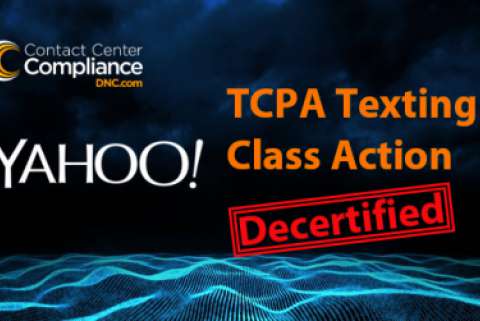In February 2018 we witnessed a rare occurrence for a TCPA class action lawsuit. The court which had initially certified a class action, found that significant questions about “consent” constituted grounds to decertify the class. The case is Johnson v. Yahoo!, Inc..
The U.S. District Court for the Northern District of Illinois decertified the text messaging class action based on the introduction of new evidence obtained during the class member identification process. With the help of a third party, their discovery lead to the decision to decertify a Telephone Consumer Protection Act (TCPA) class action.
Certification of the Class
The lawsuit was filed by Rachel Johnson because of a group of text messages she received in March 2013 from Yahoo. Ms. Johnson claimed that Yahoo violated the TCPA when its’ instant message platform sent an automatic “welcome” text to her and others who were not registered Yahoo users. She alleged to have received the “welcome” text after Yahoo sent her a spam text message from another user which advertised a means to reduce debt.
Yahoo explained that part of their online instant messaging service included the ability for registered users to send instant messages to others as text messages. Built into the process was a follow-up messages sent to first time recipients which explained why they had received the initial text.
More than 500,000 cellphone users could be part of the class.
The lawsuit filed by Ms. Johnson claimed that the “welcome” message constituted as unauthorized advertising for Yahoo services which is a violation of the TCPA. Ms. Johnson sought to represent a nationwide class of individuals who received a text message from Yahoo. They were seeking up to $1,500 per text message if the violations were willful.
Despite Yahoos argument that a class action could subject them to damages disproportionate to the alleged harm, the Court certified the class of users who received the text. The class excluded registered Yahoo users since they would have provided consent to receive text messages from them.
Decertification of the Class
To identify the members of the class, the plaintiff subpoenaed records from Sprint. Yahoo then cross checked those names and phone numbers against their own records. What they found was that even though many of the numbers were not associated with a Yahoo account, there were a significant number of matches by name. Those matches left open the possibility that the list of users provided by Sprint could also be Yahoo users who had changed their phone numbers and not updated their Yahoo profiles. That meant that as registered Yahoo users they may have indeed have provided consent.
For the court, this revelation revealed that the class was not manageable due to overwhelming questions of consent. For class certification, there must be “commonality” among the members of the class. The requirement is necessary so that the court doesn’t get burdened with having to perform individualized analysis on the facts to determine each member.
The court concluded that additional individualized inquires would be required to determine members of the class. Their conclusion meant that the lawsuit did not meet the “commonality” requirement for class action standing.
“Those who agreed to the Yahoo’s Universal Terms of Service, consented to the welcome message.” -- Judge Manish Shah
Yahoo was able to show the court that at least a quarter of the members of the class had agreed to Yahoo’s Universal Terms of Service. In this rare instance, the Court decided to decertify the class so that the members could be evaluated individually.
Conclusion
This decision in Yahoo’s favor demonstrates that an order granting class certification does not necessarily mean all is lost for a business conducting telemarketing. Individualized questions of consent can be used to prevent class certification or even reverse a court’s decision and decertify the class. It also, shows the importance of considering whether relevant evidence might be in the possession of third parties. In this case, the Yahoo benefited from the records released by Sprint.
“Consent” is the underlying issue that brought this lawsuit before the courts. Understanding the type of consent required on any given telemarketing campaign is a challenge faced by business small and large. Unfortunately, one mistake could cost your business thousands or millions of dollars, even if the lawsuit settles.





